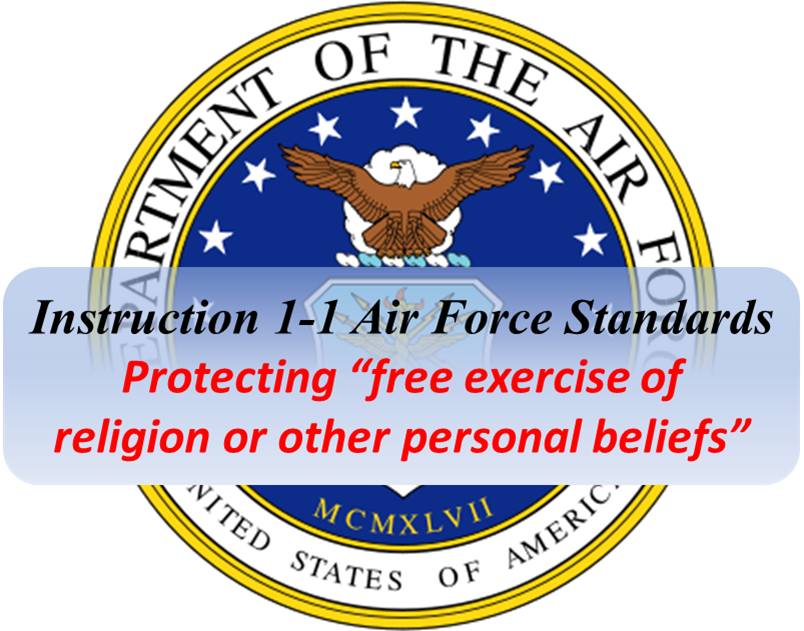New Air Force Standards Protect Nonreligious Personal Beliefs
 Airmen everywhere just received a new foundational regulation for their use – Air Force Instruction 1-1 Air Force Standards. The regulation covers values, conduct, ethics, equal opportunity, and appearance.
Airmen everywhere just received a new foundational regulation for their use – Air Force Instruction 1-1 Air Force Standards. The regulation covers values, conduct, ethics, equal opportunity, and appearance.
This regulation also serves to codify the interim guidance on religious accommodation released in 2000, 2006, and 2011. In particular, this guidance recognizes nonreligious/nontheistic beliefs:
“Leaders at all levels must balance constitutional protections for an individual’s free exercise of religion or other personal beliefs and the constitutional prohibition against governmental establishment of religion.”
The regulation still only implies chaplain responsibility for those with nontheistic beliefs and promotes the idea of “spirituality” without caveat.
“The Chaplain Corps provides spiritual care and the opportunity for Air Force members and their families to exercise their constitutional right to the free exercise of religion.”
This wording is not clear enough to encourage chaplains to reach out to atheists and humanists with the same support they provide Christians, Jews, and even Wiccans.
A technical distinction in the regulation is listed in section 2.12.1: “You should confidently practice your own beliefs while respecting others whose viewpoints differ from your own.” This section advises respect for people, not beliefs, a distinction MAAF has strongly advised in training development at the Air Force Academy. We show respect for each other when we are honest about our disagreements.
Freedom of conscience is set aside later in the instruction. The most concerning portion of the regulation involves vague and extreme restrictions that prohibit any internet comments or blog posts “which reasonably can be anticipated, or are intended, to degrade morale, good order, and discipline of any members or units in the U.S. Armed Forces, are Service-discrediting, or would degrade the trust and confidence of the public in the United States Air Force.” This essentially means that any Air Force leader can initiate UCMJ action against anyone who posts nearly anything on the internet.
NBC news and other major outlets headlined restrictions on tattoos. This “capstone act” of recently-retired Chief of Staff of the Air Force General Norton Schwartz deserves more focus than tattoos. The regulation builds on prior guidance enforcing government neutrality toward religion. However, NBC also rightfully pointed out the long evangelical history that makes increased controls important:
The conflicts have arisen over military leadership promoting Christian religious meetings through official channels, military courses incorporating Biblical material in coursework, officers trying to convert non-Christians and allegedly favoring “born again” Christians and using Christian doctrine and imagery in logos and official military materials and Christian prayer in official events.
The new AFI 1-1 from the Chief of Staff’s office follows from guidance from the Secretary of the Air Force Policy Directive 1 – Air Force Culture, which is a short publication that roots Air Force culture in the Constitution and the Airman’s Creed and Air Force Values. The Creed and values promote integrity, service, excellence, and valor. These secular values are and must be shared throughout the Air Force to strengthen the military team. Air Force Values should neither replace one’s personal beliefs nor be pushed aside in favor of one’s personal beliefs. Rather, one’s personal beliefs should provide a strong foundation for professional Air Force values. The protections in the new AFI 1-1 are a step in the direction of religious neutrality in government and equal support for all.
A journey of a thousand miles begins with a single step. – Lao Tzu
